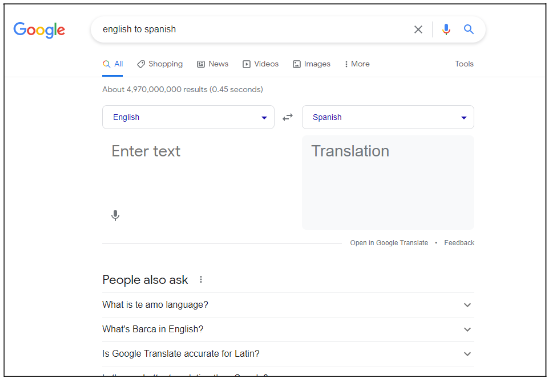What Are Keywords in SEO?
You might be wondering: what are keywords in the context of SEO? Keywords are simply words and phrases that people type into search engines when they’re looking for something on the Internet. For instance, if you are looking for a plumber near you, you might search for keywords like “professional plumber near me” or simply “plumbing services”.
Keywords are extremely important in SEO because they serve as the foundation for the entire optimisation process.
Remember that SEO’s main goal is to get your pages ranked in search engines for keywords that your target audience are commonly searching for.
What Is Keyword Research in SEO?
On the flip side, your SEO efforts will be futile if you are ranking for keywords that are not being searched online. This is why doing keyword research is important for your SEO initiatives to be successful, even with all the algorithm updates this year. Identifying keywords that people type into search engines is known as keyword research.
Read on to gain further insight into this complex process.
Keyword Research Checklist
How do you decide which keywords are worth pursuing? Let’s review a checklist that should help you pick the right keywords.
Checklist # 1 – Search Demand
The first thing to look for is the search demand for a keyword. The volume of monthly searches for a keyword is known as search demand. This can be measured using a keyword metric known as search volume. We can find the search volume for a keyword by using keyword research tools like Ahrefs Keywords Explorer.
For instance, a query like “km to miles” gets searched around 100,000 times in Australia alone. But as you check in your keyword research tool, almost 75% of searches go without clicking on a page. That’s because Google has a handy translator to solve the searchers’ problem. As a result, search volume alone can be deceiving. That is why it is crucial to look at the second checklist, which is the traffic potential of your topic.
Checklist # 2 – Traffic Potential
The total search traffic you could generate if you were to rank first on Google for your keyword is known as traffic potential. You can use your preferred site explorer to check the statistics of a particular page. Let’s say your page ranked first for the query “keyword research guidelines”, and it sends 1000+ month search visits from Australia. Still, if you look at the total global organic traffic to your page, you’ll probably see that you got almost double or triple the monthly visits from Google than the one you got from Australia alone. That’s because your page ranks for more than 100 keywords.
This kind of traffic potential result is not impossible. A study of 3 million keywords showed that, on average, the top ranking page ranks for nearly a thousand other keywords in the Top 10. As a result, even if you optimise your sites for the main keyword, they will likely rank for hundreds or perhaps thousands of other relevant keywords.
Because of that, the monthly search traffic potential of the topic “keyword research guidelines” is higher than its monthly search volume. This is why traffic potential is far more accurate than search volume. One way to assess traffic potential is to determine how much traffic the top ranking pages receive.
However, this is not always the case. There will be a time that your search volume is high, but the traffic potential is way lower. This now becomes more of a business decision if you still want to proceed with the topic or not. It’s not a good idea to choose keywords just based on metrics. This is why the remaining items on this checklist are equally critical.
Checklist # 3 – Business Potential
The value of a keyword to your business is represented by its business potential. Your niche and business model almost entirely determine the value. Assigning scores to the keywords you’re researching is easy to achieve. The higher the number, the more important the topic is to your business.
Checklist # 4 – Search Intent
The reason for a searcher’s query is known as search intent. Looking at the top-ranking pages for the keyword you want to rank for is one easy way to know this. One of the crucial things to show search engines that your page will achieve the platform’s goal is to match specific search intent.
How to Analyse Search Intent?
It’s simple to determine search intent; simply search for the keyword you want to rank for and then analyse the top-ranked results. Because Google knows what searchers want better than anybody else, the top ranking results are a superb proxy for understanding search intent.
Analysing may sound like jargon, but here are three simple formulas (called the 3 C’s of Se arch Intent) that you could use:
- Content Type – blog articles, videos, product pages, category pages, and landing pages are all examples of content types.
- Content Format – this refers more to blog posts and landing pages. How-to guides, step-by-step tutorials, list postings, and opinion editorials are all common blog formats. For a landing page, that might be something like a tool or a calculator.
- Content Angle – it’s essentially your “hook” for getting people to visit your page. It frequently displays the advantage.
Checklist # 5 – Ranking Difficulty
The final checkpoint is to see whether you can rank for your keyword. If you can’t rank your keyword soon, the search volume, traffic potential, and business potential are meaningless. It takes research and practice to figure out how difficult it is to rank for a certain keyword.
Finding the right balance on this checklist is essential when choosing keywords. Is the topic generating enough traffic and providing enough business value to justify the effort? You should ask yourself this question before creating pages to rank in search results.
How to Find Keywords for Your Website?
The process of finding keywords that people use in search engines is known as keyword research. The overall procedure can be broken down into two macro steps.
Step 1: Generate Keyword Ideas
To come up with keyword ideas for your website, you’ll need to use keyword research tools. Keyword research tools provide information on keywords such as search volumes, keyword difficulty scores, and other SEO indicators. They should also assist you in identifying potential topics to pursue.
There are a lot of tools out there, and you are free to use whichever you want. Whenever you are using a keyword research tool, you might need to first come up with a seed keyword (a broad keyword related to your niche) to help you find the best ones for your website.
For example, let’s say your niche is tennis so your seed keyword might be a tennis racket, tennis ball, or tennis shirt. With this, it can help you get topic ideas that are related to your keywords.
Step 2 – Validate the Keywords
Remember, when choosing keywords, you have to consider the checklist we previously discussed. You would want your keywords to have:
- Search Demand
- Traffic Potential
- Business Potential
- Search Intent
- An idea on Rank Difficulty
Once you can apply all of this when doing your keyword research, you will surely be able to find the best key phrases for your website. Make sure that you cover everything you need to cover when generating keyword ideas.
Let SEO Experts Guide You in Your Search
You might be wondering: what exactly do I write about to satisfy searchers? The best answer is to learn from your competitors’ pages. The top-ranking pages are ranking at the top for a reason. Google and other search engines deem them as the best candidates to meet and fulfil a searcher’s query. They are clearly doing something right—at least from a search engine’s perspective.
Of course, this is a lot of information to take in. But if you feel strongly compelled to give SEO a shot for your growing business in Melbourne, SEO agency like TopRankings offer proven, specialised, customised, and white hat-guaranteed strategies for your brand.
Get in touch today for a complimentary website review. Simply register your details via our enquiry form or call us at 1300 881 911.




